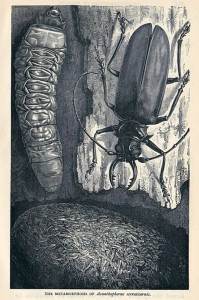
A team of entomologists in India had to put their new species celebration on hold last year, when they found out their discovery had already been discovered.
The Journal of Insect Science paper, initially published in December 2012, was retracted in October 2013, after several entomologists confirmed that the beetle was actually a previously identified species called Acanthophorus serraticornis. (The notice has a November 2014 date, but we understand that’s because the journal switched servers.)
Here’s the notice for “A new record of longicorn beetle, Acanthophorus rugiceps, from India as a root borer on physic nut, Jatropha curcas, with a description of life stages, biology, and seasonal dynamics”: Continue reading That new beetle? Actually, it’s really an old beetle






